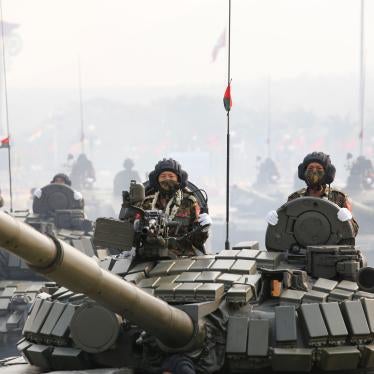I have spent more than a decade documenting the use of child soldiers in Myanmar, and have interviewed boys who were only 11 when they were forced to join the army. Initially, Myanmar's government flatly denied any use of children by its army, despite evidence that children were systematically recruited in large numbers.
More recently, the authorities have not only acknowledged the problem, but signed a formal UN agreement to release all children from the forces by the end of this year. But disturbing evidence shows that the underground trade in underage soldiers remains a serious problem.
Myanmar law explicitly forbids recruiting children under 18 to the armed forces. But recruiters are under pressure from central command to maintain high rates of enlistment, and continually bring in new recruits to offset high rates of desertion from the army. To fill their quotas, they work with corrupt members of the civilian administration to obtain forged documents or illegally procured ID cards to bring in underage soldiers, often by force. The system thrives because senior officers have consistently failed to reconcile the conflicting messages to field units throughout Myanmar: keep your numbers high but don't force children into the ranks. Most units think maintaining troop strength is the imperative.
I interviewed young soldiers who said recruiters received cash, and bags of rice or cooking oil each time they delivered a new recruit to the army's recruitment centres. The current going rate for a new recruit is US$20-$50 at the current exchange rate, an amount that is 1.5 to three times an army private's typical monthly salary. Battalion commanders who failed to meet their recruiting quotas were disciplined, including by losing their command postings. These incentives, quotas and penalties for failing to reach quotas have historically fuelled high rates of child recruitment into the Tatmadaw - and continue to do so today.
In New York, negotiations are underway in the UN Security Council regarding Myanmar's progress in ending its use of child soldiers. Last month, Myanmar assured the UN Security Council of its "firm commitment" to addressing the problem. Under the agreement it signed in June of last year, the government agreed to identify and register all children in the armed forces within 135 days and to release all children from the armed forces by December this year.
Despite lofty rhetoric from top commanders, there has been very little progress. Children continue to be recruited while very few have been released. Since April 2009, the International Labour Organisation (ILO) has verified 770 cases of underage recruitment, including children as young as 10, and at least 32 cases in 2012. The actual number is almost certainly higher. Only an estimated 66 children were released from government forces between June 2012, when the action plan was signed, and the end of January, despite indications that thousands of children remain in the army's ranks. The army has also tried to institute a new policy, against its own laws and commitments, to permit recruitment of 16 year olds if they have passed the 10th grade.
Myanmar military has also actively obstructed the UN's efforts to verify the use of child soldiers. Four times in the past year, the military has refused UN personnel access to military bases, in violation of the signed action plan. It is also blocking all access to the Border Guard Forces (BGFs), former ethnic insurgents with ceasefires now arranged as paramilitary units in Myanmar's hinterlands and under nominal army control, but often predatory business militias involved in illicit trade and resource extraction. More than a dozen non-state armed groups, many with longstanding child-soldier use, such as the Karen, Shan and Wa armies, and listed in the UN secretary-general's reports, have reached tentative ceasefires with the central government since late 2011, but the Myanmar military refuses all engagement by international monitors.
The UN Security Council considers Myanmar's army a "persistent perpetrator" because of its long history of child-soldier use, and in the past, has stated it will consider sanctions against such violators. Council members may be tempted to believe the government's assurance of progress. Last month, Myanmar told Council members that it could become "a model success story" in ending the use of child soldiers. This won't happen, however, without close monitoring and continued pressure from other governments. The Security Council needs to make clear that it will impose sanctions if Myanmar does not meet its commitment to end all use of child soldiers by the end of December.
The longstanding trade in, and systematic abuse of, child soldiers in Myanmar will only end when the Myanmar military itself decides to change its culture and make it clear that it will effectively enforce its own laws. That can't happen as long as recruiters receive incentives for bringing in young boys and receive just a slap on the wrist if they are caught. The army has seven months to meet the deadline of releasing all children from its forces. It needs to get serious.








